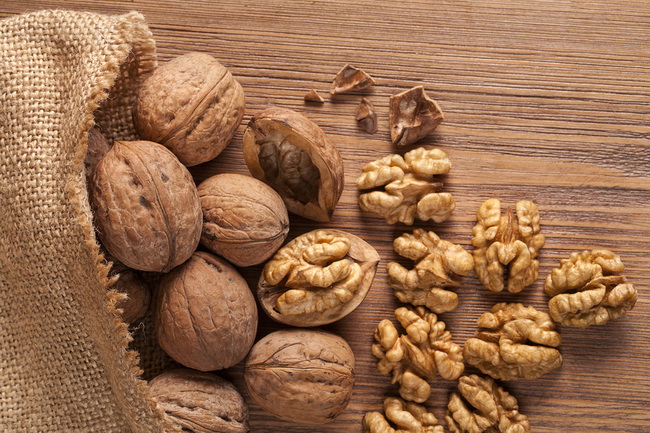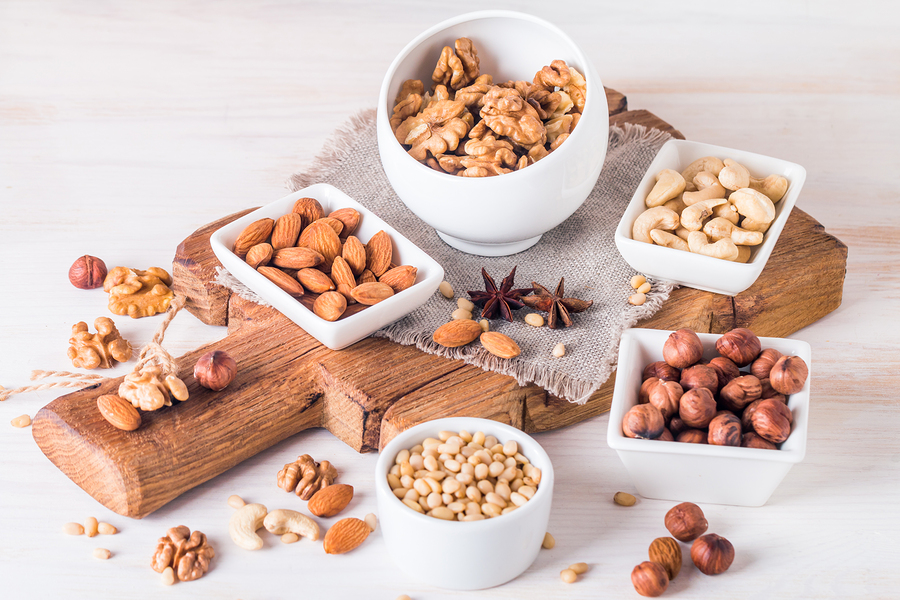- Make It Yourself Lavender Heart-Shaped Bath Bombs!
- 20 Things You Never Knew About “Down There”
- 12 Best Foods For Those Suffering From Arthritis Pain
- 12 Personal Hygiene Mistakes Almost Everyone Makes (Mom Never Told You About #4!)
- 15 Medicinal Plants And Herbs From The Cherokee People
- 12 Mind-Blowing Benefits Of Drinking Coconut Water During Pregnancy
- 12 Outstanding Winter Foods That Won’t Fatten You Up Like A Christmas Turkey
12 Reasons Why You Should Eat More Walnuts Every Day

Photo credit: bigstockphoto.com
There are so many foods on the market that contribute so many healthful benefits in so many areas, it would be in your best interest to add them to your regular diet. So is the case with walnuts. This tasty, but extremely healthy nut can help your body do everything from helping you sleep better at night to improving a man’s fertility levels.
If you automatically love walnuts it will be easy for you to start eating them every day. If you like them, there are plenty of ways you can add walnuts to your meals and snacks so you can reap the benefits of their healthy ways. You only need about one ounce of walnuts every day added to your diet to realize any and all of these benefits.
Here are some proven areas where eating walnuts on a daily basis could help you stay in shape and actually save your life in many areas.
1. Lowers your chances of death by cancer
A study that assessed the benefits of adopting the Mediterranean diet discovered that those who did follow it and included walnuts in it were less likely to die from cancer. In addition, another study conducted at the Harvard School of Public Health proved that those who consumed a handful of walnuts every day had a 20% less chance of dying from any reason over a span of 30 years.
Continue to Page 2

Photo credit: bigstockphoto.com
2. Helps keep your weight under control
Walnuts have been proven to help you lose weight. A Harvard Medical School study was conducted using weight loss shakes. One group received a protein shake with walnuts and the other group received a placebo shake. The group with walnut shakes were more full and not hungry reducing their urge to overeat.
3. Assists insulin levels in diabetics
Researchers in Australia were able to prove the value of walnuts in fighting diabetes within just three months. They test studied 50 people who were adults suffering from obesity and diabetes. The testing went on for a year and participants were required to follow a low-fat program. The group that included 30 grams of walnuts in their diets every day experienced a lower number in their fasting levels than those who didn’t within the very first three months.
4. Helps ease stress levels
In order to test the difference in stress levels that walnuts can achieve, a study was conducted that tested those with higher LDL levels in their cholesterol readings. Each group was put under stressful situations, either by having their foot put into cold water or having to give a speech to a group of people. Those whose diets consisted of walnuts or walnut oil had much lower LDL readings than those who did not consume walnuts.
5. Strengthens bones
Walnuts have been found to have ellagic acid, which is a strong polyphenol in the extract of walnuts. This acid was discovered by Greek researchers to have a powerful benefit for strengthening bones.
Continue to Page 3

Photo credit: bigstockphoto.com
6. Possesses strong antioxidant properties
When it comes to its antioxidant properties, walnuts are brimming with benefits. They have just about two times the amount of antioxidants as just about any other nut and they have up to 15 times more benefits as vitamin E.
7. Helps decrease tumors from breast cancer
Studies that followed the development of breast cancer cells in animals found that the consumption of walnuts lowered the size and amount of breast cancer tumors. The researchers credit the combination of the phytosterols in the walnuts along with the amount of antioxidants and omega-3 fatty acids.
8. Reduces colorectal cancer
Another study regarding cancer cells tested the effects on colorectal cancer. Researchers at the Harvard Medical School gave mice walnuts and found that the amount of colorectal tumors were reduced by 27% and the size of the tumors were lowered by 33%.
9. Provides you with clearer thinking
An independent study of college students tested those who consumed placebos with those who actually ate walnuts every day. Within the eight-week period, the students who ate the walnuts showed an increase of 11.2% in their reasoning abilities.
Continue to Page 4

Photo credit: bigstockphoto.com
10. Increases fertility levels in males
This statistic regarding walnuts and the fertility of men is amazing. UCLA consulted a study where researchers studied 117 men who ate a regular diet. Fifty-nine of these men consumed 75 grams of walnuts each day while the rest of the men did not. The conclusion of the 12-week study showed that those consuming walnuts had a “significantly improved” vitality of sperm, quality, and motility.
11. Ensures support for cardiovascular diseases
Walnuts have long been recognized for being heart healthy. A study that was conducted at the University of Wisconsin followed 36 participants who consumed 30 grams of English walnuts every day for 30 days. They found their endothelial function and blood lipid profiles greatly improved and they did not gain any weight at all. Another study in Iran consisted of half of the volunteers eating 20 grams of walnuts every day while the other group did not. The group that consumed the walnuts found their triglyceride levels were reduced by 17.1% and their good cholesterol (HDL) was brought up by 9%. The group who did not consume walnuts showed no changes in their numbers.
READ ALSO: Proof That Nuts Have Unlimited Health Benefits
12. Helps you sleep better
Getting just the right amount of sleep each night is a fine balance. If you sleep too little you will just burn out during the day. If you get too much sleep, believe it or not, it will still make you tired and you will find yourself yawning when you least expect it. Welcome walnuts to the rescue. Walnuts have the compound known as melatonin, a natural sleep aid, that can help get you settled into a peaceful night of sleep. Try walnuts before taking on any medications specifically targeted to get you to sleep. You may not need anything other than the walnuts to get some decent rest.
References:
































